- Home
- J. A. Konrath
Shot of Tequila Page 26
Shot of Tequila Read online
Page 26
His mind had been a shambles of conflicting emotions: exultation at having fought and prevailed; worry that he’d accidentally killed someone; fury at having been so stupid and incompetent; fear about what was going to happen to him. On top of everything else, humiliation. Being arrested by the local third world gendarmerie was about the biggest embarrassment a black ops soldier could suffer. He’d laughed at stories of guys it had happened to, thought they were fuckups and incompetents. But look at him now. He was one of them.
He was determined to keep his options open, to say nothing that might unwittingly preclude subsequent possibilities. He didn’t respond when the cops told him one of the men he’d fought was dead, his neck broken. Maybe they were lying, though his gut told him, sickeningly, it was true. He was silent when they pretended they were his friends, he was silent when they knocked him down and beat the shit out of him. Part of him was aware that his silence was probably making things worse. But having lost control of everything else, he found himself clinging to whatever pathetic sense of dignity and power he could derive from the simple ability to deny his interrogators his voice.
Eventually they told him they didn’t care, the guy he killed wasn’t Filipino and he wasn’t Filipino so why were they wasting their time? They’d dumped him in the Manila city jail, which Ben quickly learned from some of its English-speaking inhabitants had been built for a thousand inmates and currently housed more than five times that number. There were people of all ages, mostly Filipino but a few foreigners, too, convicted murderers serving life sentences alongside ordinary people who couldn’t afford bail and were just waiting for their day in court. It was so hot the concrete walls caused second-degree burns, so crowded the prisoners had to sleep side by side on the ground in shifts, and stank so badly from the accreted decades of concentrated piss and nonstop sweat and endemic diarrhea that you could feel the miasma on your skin like something moving and alive, something trying to worm its way into your pores so it could dissolve you from the inside out.
There was an open-air pavilion where the prisoners were served food. Twice a day, the same watery, yellowish gray porridge smelling like rotting fish. On his first morning, Ben choked it down, knowing he had to eat to stay strong, then barely made it to the corner of the pavilion before throwing it all up. A bony but tough-looking Thai guy with brown skin as drawn and dried as jerky laughed and said, “No worry! Everyone do first time, sometime second time, third time. Soon-soon, okay, yum-yum.”
“Yum, huh?” Ben said, wiping his mouth with the back of his hand.
“Not yum-yum, you die,” the Thai guy said. “So you make yum-yum.”
No one messed with him—his size and demeanor took care of that—but so what? Dummying up, he began to realize, was just a multiplication of his initial stupidity. Had the cops even filled out any paperwork? He couldn’t remember seeing any. Looking around at the shifting ranks of scrawny, gap-toothed prisoners, all of them filthy and haggard and sweating bare-chested in the heat, he could easily imagine himself being forgotten here.
On the third day, with the magnitude of his fuckup gnawing at his mind and fear settling like some dark obstruction deep in his chest, he approached the guy who looked like the head guard and asked to call the U.S. consulate. The guy didn’t even look at him, he just laughed to himself and tapped his truncheon. Ben told him he was an American citizen, there’d been a mistake, he needed to talk to the consulate, okay? The guy’s laugh drifted away and his gaze shifted to Ben. His eyes were flat and his fingers curled around the hilt of his truncheon. Ben felt a surge of anger and pictured himself snatching the puke’s truncheon off his belt and braining him with it. But he managed to shove the anger back, knowing it was what landed him here in the first place, knowing that as bad as things were, uncorking on a guard would make them infinitely, permanently worse.
As he lay down that night on the radiant, piss-stained concrete floor of the small cell he shared with a dozen other prisoners, he remembered a moment from his jungle training. They’d dropped him in a part of the Everglades so dense that even at noon the sun was just a dim green glow at the top of the tree canopy. He had three days to reach his objective, alone, and a day in he started wondering, if he didn’t make it out, how would anyone even find him? He remembered the feeling of being lost and alone, monumentally insignificant in an indifferent, alien world. And now he was fighting that feeling again, that creeping, childlike dread at having been abandoned somewhere, orphaned, marooned.
He crossed his arms and rubbed his shoulders as though trying to prove he was even still there. Nobody knew what had happened to him. Eventually, when he didn’t report in, the military would go looking, but where? He’d been inhaled like a dust mote into the lungs of a dragon. And every breath the dragon took carried him deeper into its body and farther from the light. He was in so deep already, how was he ever going to get out? In his few nightmarish days within the beast, he’d already run into guys who’d been here for years—years—without being sentenced, without even a hearing. He imagined that once you passed a certain point in a system like this one, the overseers wouldn’t let you up for air even if by some amazing coincidence they became aware of your case. At that point, after all, your story would be an embarrassment to them. And the worse your treatment, the more sympathetic your circumstances, the more egregious the entire story, the more culpable they would all be. After a certain amount of time without a hearing, being innocent would probably be the worst thing that could happen to someone in a place like this. What were they going to do, admit that for three, five, seven years, they’d caged up a guy who—oops—hadn’t even done anything, and never even gave him a hearing? Yeah, fat chance of that. Better to just leave you where you are. You’d been there that long already, and it wasn’t like anyone was asking about you. Let sleeping dogs lie, baby. Wait long enough, and eventually they’d be sleeping for good.
The next morning, as he dozed on the concrete, he was awakened by a hard poke in his ribs, which were still bruised from some well-placed kicks delivered by Manila’s finest. He shot to his feet, his back to the wall, adrenaline rocketing through him. Three guards regarded him, their truncheons out. He looked from one to the other. Reasonably good odds, maybe, but what was he going to do—cut through these three and then levitate over the wall?
One of the guards motioned with his truncheon. Ben nodded and started walking.
They took him to a small room with faded green cinder block walls and a single rattling fan that in its uselessness seemed only to worsen the clinging wet heat. A black man in jeans, sneakers, and a red polo shirt, obviously fit and somewhere in his fifties, was sitting at a peeling linoleum table in the center of the room, his shaved head beaded in perspiration. He shook his head in mild disapproval as Ben entered.
“Damn, son,” he said in his gravelly Mississippi Delta baritone. “You look like shit warmed over.”
Despite everything that had happened between them, and despite the humiliation of having his commander find him like this, Ben was so flooded with relief his legs went rubbery. He knew his situation was bad, but until this moment he hadn’t realized just how near he’d been to actual despair, how convinced he was beginning to feel that no one would ever find him.
He breathed in and out a few times, pulling himself together. When he trusted himself to speak, he said, “What are you doing here, Hort?”
Hort laughed, the sound deep and not at all unfriendly. As always, Ben was struck by the man’s complete ease and confidence, by his natural command presence. Colonel Scott Horton was a legend in the black ops community. He had personally designed and now commanded Ben’s secret unit, the absurdly blandly named Intelligence Support Activity, and his exploits in Nicaragua, Afghanistan, and elsewhere were such that he was held in awe not just by his men, but even by the Joint Special Operations Command brass who were his nominal superiors.
The laugh slowly died away, a paternal grin lingering in its aftermath. “When I heard they had vi
siting hours in hell, I just couldn’t stay away.”
“I don’t need you to bail me out.”
This was so obviously untrue Ben immediately felt like a blustering child for saying it, and expected another baritone chuckle in response.
Instead, Hort said, “It’s not a question of what you need. I’m responsible for you.”
Ben knew he was being stupid, but anger was the only thing keeping him together and he was afraid to let it go. “Got a funny way of showing it.”
“Don’t ask me to apologize for putting the mission ahead of the man, son. I already told you, it was the toughest call I’ve ever had to make.”
Hort had been tasked with securing and erasing all knowledge of an encryption application called Obsidian. The op started with the liquidation of the inventor and the patent examiner, and would have taken out Ben’s younger brother, Alex, too, who was the inventor’s lawyer, along with Sarah Hosseini, an associate at Alex’s Silicon Valley firm. But Alex had realized he was in over his head and had called his big brother for help. Together, they’d managed to turn things around, though not before Hort, in the service of putting the mission before the man, had tried to erase all three of them.
“Yeah, well don’t ask me to apologize for not forgetting.”
Hort nodded, his expression grave. “That seems fair.”
Ben walked over to the chair opposite Hort, pulled it away from the table, and sat. He knew Hort would read it as a concession, but he didn’t care. He’d never felt so wrung out. His ribs ached, he’d only half slept since all this shit had started, and much as he hated to admit it, he was terrified Hort would leave as suddenly as he’d materialized. It was a ridiculous fear, but he couldn’t shake it no matter how much he blustered.
“How’d you find me?” he said quietly.
Hort nodded, as though expecting the question. “Pressure from the Australians. You’re lucky you killed one of theirs. If it had been a local, they’d have just dumped you here and no one would ever have heard from you again.”
Ben felt something sink in his chest. He realized he’d still been hoping the cops had lied to him. The hope felt suddenly stupid, and he knew he just hadn’t wanted to admit it to himself, admit what he’d done.
“The guy was a sailor?” he said.
“Royal Marine, yeah.”
He’d known as much already, but somehow having Hort confirm it eliminated Ben’s ability to deal with the guy as an abstraction. Having this little window opened on the guy’s humanity made part of Ben want to push it open further, but he knew better. Still, even the speculation was no picnic. Had he been married? He’d been pretty young, so maybe not. And Ben hadn’t seen a ring, though he supposed the guy might have removed one before a night of carousing on Burgos Street. Regardless, he would have had parents. Maybe brothers or sisters. He thought of Katie, his younger sister, who’d died in a car accident as a high school junior, and what her death had done to his family. The thought that he probably had caused something similar to someone else’s family because he was too sullen to just walk away from some woofing was suddenly making him feel sick. Not to mention the guy himself was never coming back, either.
“Anyway,” Hort said, “the Aussies made local law enforcement go to all the hotels in Makati, asking whether there was a guest who was supposed to check out but who’d ghosted off instead. It didn’t take them long to find the right hotel, the right guest, to have the room safe opened, to check the guest’s passport. When they found out you were American, they contacted the U.S. embassy. When the embassy realized who you were, they contacted JSOC. And here I am.”
It made sense. But it only answered how Hort had found him, not why. He knew he should ask, but he almost didn’t care. He had to fight the urge to blurt out, Please, just get me out of here…
He took a breath and said, “All right, you want something from me.”
Hort pulled a handkerchief out of his pocket and used it to mop the moisture off his face and scalp. “You’re a little more cynical than the last time I saw you.”
“I wonder why that would be.”
“You want me to just leave you here? I could, you know. The Australians want to extradite you. All I have to do is step aside and let it happen.”
Somehow, hearing the threat out loud eased Ben’s mind a little. If Hort were really going to leave, he would’ve just done it. And obviously, he hadn’t come all this way just to say hello.
“Maybe your brother could help you,” Hort said. “Good to have a lawyer in the family when you’ve been charged with murder. And the girl, Sarah Hosseini. Two smart lawyers. Strange to think of them protecting you instead of you protecting them, but there you have it.”
Hort had no way of knowing what had happened between Sarah and Ben—the way their distrust had alchemized to passion, maybe to even more. He was fishing on that one.
“Do they need protection?” Ben asked, his voice low, his tone casual.
There was a pause. Hort said, “No.”
Ben nodded, not exactly reassured. Alex and Sarah still knew a lot about Obsidian and about the failed op to disappear it. It wasn’t impossible someone on the National Security Council or wherever might get sufficiently uncomfortable about their knowledge to decide to revisit the issue. But at least Hort wasn’t threatening him with it. On the other hand, he’d learned from the Obsidian op that Hort could be a master bullshitter, at least when bullshitting was required by the mission. Maybe he just knew Ben well enough to know overt threats would be counterproductive. That didn’t mean the threat wasn’t there. It wasn’t in Hort’s character or his experience to display a weapon until he was ready to use it.
“All right,” Ben said. “So you’ve pulled all these strings, you’re running interference with the Australians and who knows who else, just because you care. I’m touched, Hort. Really.”
“You know you’re on YouTube now, right? Camera phones in the bar.”
Ben looked at him, his shame so enormous he couldn’t speak.
“Relax,” Hort said. “You got lucky. The spotlighting in the bar was pointed at the cameras. You can barely make out the action, let alone your face.”
Ben managed to nod, the whipsaw from horror to relief intensifying how sick he felt from what he did to the Aussie marine. He concentrated on his breathing, trying to get a grip on emotions that were slipping past his control.
Hort looked at him. Other than the useless rattle of the fan stirring the leaden air, the room was silent.
“So tell me, son,” he said. “What were you doing in that bar?”
Ben didn’t know why, but the question made him feel suddenly wary. “What do you mean, what was I doing? I was having a drink.”
“Why?”
“I had a lot to think about. Some shit has happened to me recently, you might have noticed that. I just wanted to be alone and think. You never had something like that?”
“All the time. But if you wanted to be alone so you could think, you didn’t need a bar. Your hotel room would have been just fine. Or you could have taken a walk. Or gone to the library.”
“They don’t serve gin in the library.”
“No, they don’t. The gin was part of what you wanted, I can see that.”
Ben was getting increasingly uncomfortable. It wasn’t just what Hort was saying. It was also the quietly confident way the man was looking at him, as though he knew Ben better than Ben knew himself.
“I don’t know what you’re talking about.”
Hort looked at him. “You know exactly what I’m talking about. But maybe you need me to spell it out for you.”
Ben held Hort’s gaze. But why did he feel like flinching?
“What you wanted,” Hort said, “was to fuck someone up. And you couldn’t do that in your room, or taking a walk, or visiting a local branch of the Manila public library system. But a bar on P. Burgos Street was pretty much tailor-made. Now, maybe you didn’t mean to kill the man whose neck you crushed, maybe yo
u just wanted to hurt him. It doesn’t matter. Either way, you lost control. And an operator can never do that.”
“I didn’t—”
“Yes, you did. Now listen. I rocked your world recently, I get that. I wish it hadn’t needed to be that way, but yeah, I turned you upside down. Your commander betrayed you, you can never trust these people again, everything you believed in is wrong. That was more or less it, right?”
Ben didn’t answer. He hadn’t thought of it in those terms exactly, but… Shit, was he really that transparent? He could feel his face burning.
“So you decided it was over with you and the unit, you were done. The problem is, you’re a man with a lot of energy inside you and you needed to divert it to something else. So you flew to Manila, where your ex-wife lives with your daughter. You thought you were going to be a better person, didn’t you, maybe reconcile with your ex, be a father to your little girl. Attach yourself to something new, like a man falling in love on the rebound. But it didn’t go well, did it?”
Ben felt his shame coalescing into anger. “Back off, Hort.”
“No, I will not back off. You went to see them, didn’t you? And your woman turned you away. Or you saw her with another man. Or both, or whatever. Well, that’s two rejections in a row, twice your world’s been rocked. Now, some men deal with rejection and humiliation and confusion by wallowing in self-pity. Some of your more self-actualized types can let it roll off their backs. How about you? How do you deal with it?”
Ben stared at Hort, his lips thinned, his nostrils flared. It was like being stripped, being stripped and laid bare. He wanted to blast the table out from between them and slam Hort into the wall, over and over until his eyes rolled up in his head and he learned to shut up, just shut the fuck up…
“For example,” Hort said, as though reading his mind, “how are you dealing with it right now?”

 What Happened to Lori
What Happened to Lori Shot Girl
Shot Girl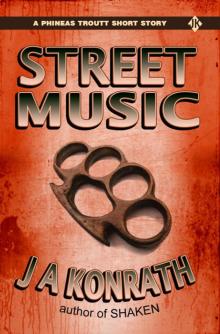 Street Music
Street Music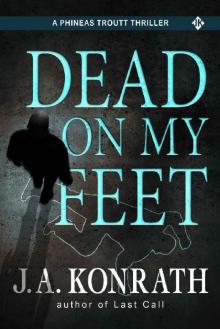 Dead on My Feet
Dead on My Feet What Happened To Lori - The Complete Epic (The Konrath Dark Thriller Collective Book 9)
What Happened To Lori - The Complete Epic (The Konrath Dark Thriller Collective Book 9)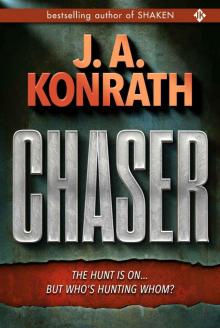 Chaser
Chaser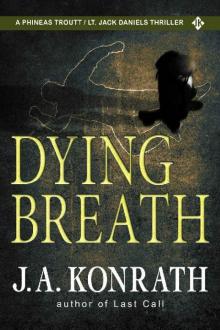 Dying Breath - A Thriller (Phineas Troutt Mysteries Book 2)
Dying Breath - A Thriller (Phineas Troutt Mysteries Book 2) Jack Daniels Six Pack
Jack Daniels Six Pack Jacked Up! (A Lt. Jack Daniels/Leah Ryan Mystery)
Jacked Up! (A Lt. Jack Daniels/Leah Ryan Mystery)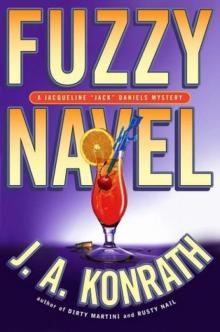 Fuzzy Navel
Fuzzy Navel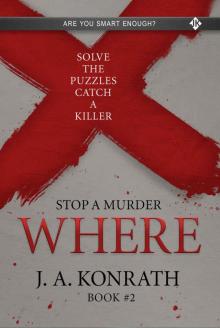 STOP A MURDER - WHERE (Mystery Puzzle Book 2)
STOP A MURDER - WHERE (Mystery Puzzle Book 2) Epitaph
Epitaph Hit: A Thriller (The Codename: Chandler)
Hit: A Thriller (The Codename: Chandler) Cheese Wrestling: A Lt. Jack Daniels/Chief Cole Clayton Thriller
Cheese Wrestling: A Lt. Jack Daniels/Chief Cole Clayton Thriller Shapeshifters Anonymous
Shapeshifters Anonymous STOP A MURDER - HOW (Mystery Puzzle Book 1)
STOP A MURDER - HOW (Mystery Puzzle Book 1) Bloody Mary
Bloody Mary Dying Breath
Dying Breath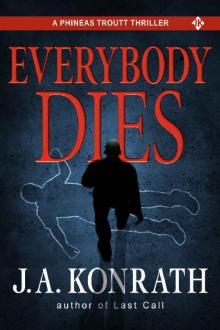 Everybody Dies - A Thriller (Phineas Troutt Mysteries Book 3)
Everybody Dies - A Thriller (Phineas Troutt Mysteries Book 3) DRACULAS (A Novel of Terror)
DRACULAS (A Novel of Terror) Shot of Tequila
Shot of Tequila Last Call - A Thriller (Jacqueline Jack Daniels Mysteries Book 10)
Last Call - A Thriller (Jacqueline Jack Daniels Mysteries Book 10) Holes in the Ground
Holes in the Ground![Shaken [JD 07] Read online](http://i1.bookreadfree.com/i1/04/01/shaken_jd_07_preview.jpg) Shaken [JD 07]
Shaken [JD 07]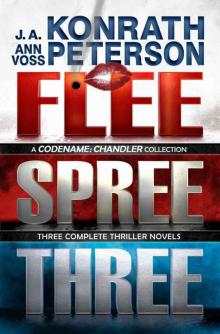 Flee, Spree, Three (Codename: Chandler Trilogy - Three Complete Novels)
Flee, Spree, Three (Codename: Chandler Trilogy - Three Complete Novels)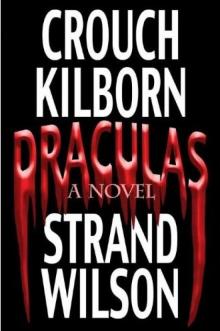 Draculas
Draculas Jack Daniels Stories
Jack Daniels Stories Wild Night is Calling
Wild Night is Calling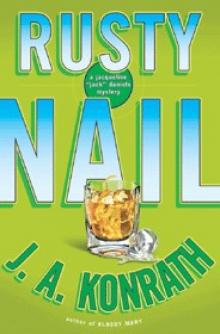 Rusty Nail
Rusty Nail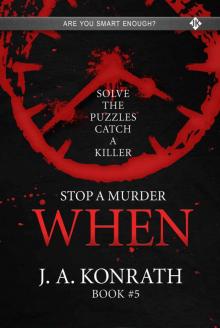 STOP A MURDER - WHEN (Mystery Puzzle Book 5)
STOP A MURDER - WHEN (Mystery Puzzle Book 5) Whiskey Sour
Whiskey Sour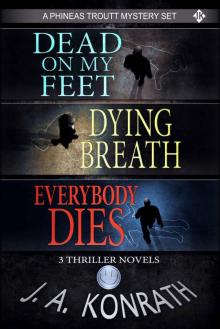 Phineas Troutt Series - Three Thriller Novels (Dead On My Feet #1, Dying Breath #2, Everybody Dies #3)
Phineas Troutt Series - Three Thriller Novels (Dead On My Feet #1, Dying Breath #2, Everybody Dies #3) Floaters - A Jack Daniels/Alex Chapa Mystery
Floaters - A Jack Daniels/Alex Chapa Mystery J.A. Konrath / Jack Kilborn Trilogy - Three Scary Thriller Novels (Origin, The List, Haunted House)
J.A. Konrath / Jack Kilborn Trilogy - Three Scary Thriller Novels (Origin, The List, Haunted House)![Shaken (Jacqueline Jack Daniels Mysteries) [Plus Bonus Content] Read online](http://i1.bookreadfree.com/i2/04/10/shaken_jacqueline_jack_daniels_mysteries_plus_bonus_content_preview.jpg) Shaken (Jacqueline Jack Daniels Mysteries) [Plus Bonus Content]
Shaken (Jacqueline Jack Daniels Mysteries) [Plus Bonus Content]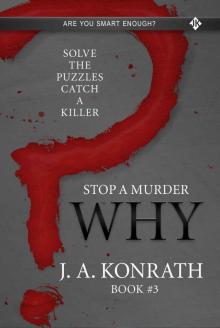 STOP A MURDER - WHY (Mystery Puzzle Book 3)
STOP A MURDER - WHY (Mystery Puzzle Book 3)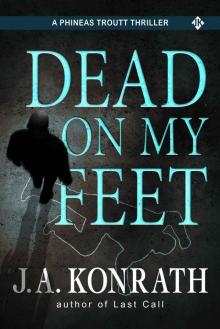 Dead On My Feet - A Thriller (Phineas Troutt Mysteries Book 1)
Dead On My Feet - A Thriller (Phineas Troutt Mysteries Book 1) Cherry Bomb
Cherry Bomb Rum Runner - A Thriller (Jacqueline Jack Daniels Mysteries Book 9)
Rum Runner - A Thriller (Jacqueline Jack Daniels Mysteries Book 9) With a Twist
With a Twist Dirty Martini
Dirty Martini Naughty
Naughty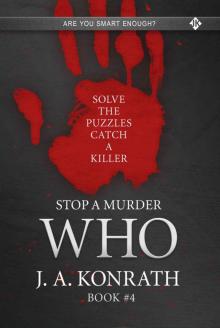 STOP A MURDER - WHO (Mystery Puzzle Book 4)
STOP A MURDER - WHO (Mystery Puzzle Book 4)